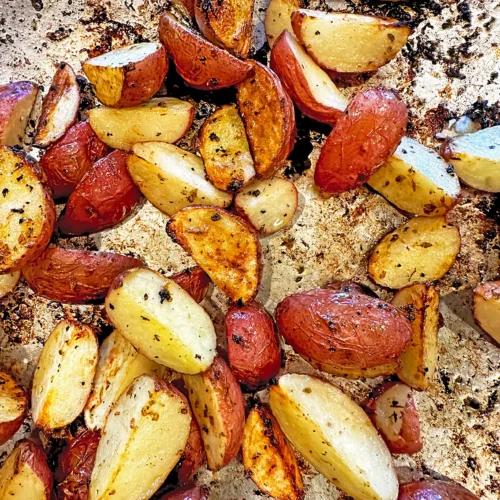Try our favorite, clean protein powder: See our top pick →
Try our favorite, clean protein powder: See our top pick →
This post contains links through which we may earn a small commission should you make a purchase from a brand. This in no way affects our ability to objectively critique the products and brands we review.
Evidence Based Research To fulfill our commitment to bringing our audience accurate and insightful content, our expert writers and medical reviewers rely on carefully curated research.
Read Our Editorial Policy
If you’ve ever wondered how your favorite Greek restaurant makes juicy yet crispy lemon potatoes, this recipe is for you.
Our Greek lemon potatoes recipe features tender Yukon gold or red potatoes that hold up well to roasting, fresh lemon juice, aromatic garlic, and savory oregano.
This versatile side dish pairs well with many main courses, is easy to prepare with minimal ingredients, and is absolutely delicious—let’s dive in!
Making Greek potatoes is very simple! You only need a handful of ingredients (many of which you probably already have in your pantry). Preparing them only takes a few minutes—the rest is hands-off roasting in the oven.
Scrub your potatoes and slice them into wedges (the thinner they are, the faster they will cook and the crispier they will get). Next, mix in some classic Greek flavors like lemon, oregano, and garlic and one cup of broth or water.
The last step is the easiest: pop them in the oven and forget about them! (Well, not for too long—you’ll need to give them a quick stir halfway through.)
The timing will differ based on your oven and the thickness of your potato wedges. They will most likely take around 40 to 50 minutes. If you want them crispier, keep them in longer!
Of course, potatoes are the star ingredient of Greek lemon potatoes! The type you use matters. For the best results, use Yukon gold or red potatoes.
Similar to fingerling potatoes, Yukon potatoes are waxy, as opposed to starchy potatoes like Russet. Waxy potatoes hold together better when roasted, while starchy potatoes are better for mashing or pureeing.
Freshly squeezed lemon juice is a cornerstone of Greek cuisine; Greek potatoes are no exception.
This recipe uses ⅓ cup of lemon juice, which might take 3 or 4 lemons depending on how juicy they are.
If you don’t have enough fresh lemons (or don’t want to give your hands the workout of squeezing so many), use bottled lemon juice in a pinch. However, we recommend fresh lemon juice—it really is much better!
We roasted the potatoes in avocado oil, a neutral oil that allowed the flavors of the lemon and garlic to shine.
However, you can’t get more Greek than extra-virgin olive oil, which adds a fruity, slightly peppery, and herbal flavor.
One-quarter of a cup of oil may seem like a lot, but it’s necessary if you want to give the potatoes crispy edges.
Garlic is a significant ingredient in Greek cuisine (as well as many others worldwide), adding depth and flavor to many foods.
While garlic is not inherently Greek, it is an essential ingredient in Greek dishes, including these potatoes.
We used five or six garlic cloves, grated freshly with a microplane grater. Although you could mince garlic, we like the finer texture of using the microplane (plus, it’s way easier). As a quick note, garlic powder will not suffice here—you need fresh garlic!
Adding a cup of broth ensures the potatoes remain moist and flavorful during the roasting process.
You can use chicken or vegetable broth, but we wouldn’t recommend beef broth for this recipe. If you don’t have broth, water will also work—of course, it will have less flavor than broth.
It’s important not to skip out on the liquid entirely. The potatoes need liquid to soak up all of the lemony, garlicky goodness!
Essentially, the broth acts as a braising liquid so the garlic doesn’t burn. It also helps the potatoes get slightly crispy on the edges yet stay juicy in the middle.
Oregano is a classic herb used in Greek cuisine. The name “oregano” comes from the Greek words “oros” (mountain) and “ganos” (joy), translating to the “joy of the mountains.” It also refers to oregano’s prevalence in the mountainous regions of Greece.
We used dried oregano, but fresh oregano would also be delicious.
Of course, salt is needed for every savory side dish. This is especially true for potatoes, which can be bland on their own. Feel free to use salt to your taste preferences, plus black pepper if you’d like.
Greek lemon potatoes go well with many different main dishes or other sides. Some ideas of what to serve with Greek potatoes include:

These potatoes (in addition to fingerling potatoes) are waxy, as opposed to starchy (like you’d see with Russet potatoes). This texture helps hold the potatoes together better when roasted. We did not peel the potatoes (we like the additional texture of the skin), but feel free to use peeled potatoes if you prefer.
Yukon gold and red potatoes are generally smaller than Russet potatoes, so each pound is typically about 4-5 small potatoes or 2-3 medium/large potatoes. Depending on their size, two pounds of Yukon gold or red potatoes might be 4-10 potatoes.
Greek lemon potatoes are pretty simple! All you need is a waxy potato (like Yukon gold or red), a neutral oil (like avocado oil; olive oil will also work), lemon juice, garlic, chicken broth or vegetable broth, and seasonings like salt, pepper, and dried oregano.
Subscribe now and never miss anything about the topics important to you and your health.